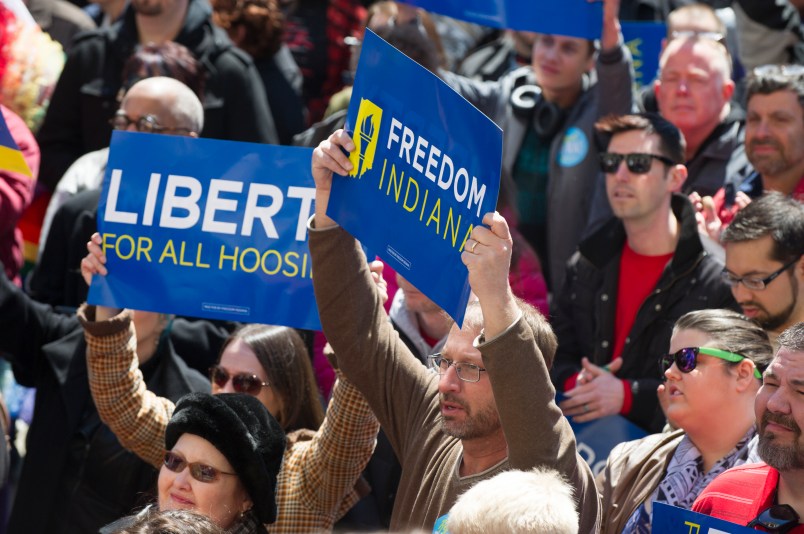You may have heard that the government is forcing businesses not to discriminate. It isn’t. If you chose to run a business, you have to follow the laws. If you don’t, that’s a choice—and you choose to suffer the consequences.
Still, in the wake of the controversy surrounding Indiana’s law, conservatives don’t see it that way. Even potential Republican presidential candidates are getting in on the assertions. Rick Santorum recently said:
If you’re a print shop and you are a gay man, should you be forced to print ‘God Hates Fags’ for the Westboro Baptist Church because they hold those signs up? Should the government—and this is really the case here — should the government force you to do that? This is about the government coming in and saying, “No, we’re going to make you do this.” And this is where I think we just need some space to say let’s have some tolerance, be a two-way street.
There are two problems with Santorum’s reasoning. The first is that a printer doesn’t have to make such signs, under any law, because refusing to do so is not discrimination in any legally prohibited sense. A print shop can also refuse to print a poster that says, for instance, “F*ck Rick Santorum,” either because it disagrees with the language or the sentiment. Both are entirely legally permissible decisions any business can rightfully make.
But let’s say the printer is asked to make a communion sign or a gay wedding sign. In this case—especially in states that prohibit discrimination based on sexual orientation as well as religion—refusing to print such a sign would indeed be illegal. The government isn’t forcing that business to do anything other than follow the law. Which is what we expect of all businesses, equally.
This issue of government force is a funny one. You could also argue that the government is forcing you to drive below the speed limit or wear a seatbelt in your car. But it’s not. There isn’t a police officer holding a gun to your head literally forcing you to buckle up. In fact, you are 100 percent free to speed and not wear your seatbelt—and simply deal with the consequences if you’re pulled over. Is the threat of the fine for breaking the law amount to “forcing” you to follow the law? No.
And more to the point, the government certainly isn’t forcing you to drive. If you don’t like the speed limit and seatbelt rules, and don’t want to be subject to the consequences of breaking them, then you can not drive. Whether to drive or not is your choice.
This all seems simple when we talk about driving, but somehow a fringe set of rightwing conservatives want us all to believe that hapless business owners are somehow being forced, against their will, to serve pizza to gay people. Nothing could be further from the truth. If you don’t want to serve pizza to gay people, by all means, don’t—which, by the way, is legal in Indiana and 28 other states, but even where it is illegal, you’re still free to do so and deal with the consequences of breaking the law. That, pizza shop owner, is your choice. And if you don’t want to deal with those consequences, well, no one is forcing you to be in the pizza business. You’re free to do something else.
In the wake of the Loving v. Virginia ruling in 1967, Bob Jones University, a Christian college in South Carolina that explicitly denied admissions to black students, maintained its policy against interracial dating and marriage, citing the Bible. So the school suffered the consequences. In 1983, the Supreme Court upheld the decision of the Internal Revenue Service to revoke Bob Jones University’s tax-exempt status. But the university was still free to continue its discriminatory practices. In fact, while the school did start admitting African-Americans in the 1970s, the ban on interracial dating was only lifted in 2000.
In the United States, private businesses get all kinds of government support—a functional monetary system, police that safeguard private property, roads that help deliver customers and goods, public schools that educate workers, telecommunications infrastructure, legal protections against copyright and patent infringement, tax benefits for business expenses and employee health care, legal shields for owners and more. No one is forcing businesses to take advantage of all those benefits, nor forcing you to start a business to begin with nor forcing you to do so in a state with non-discrimination laws or in the United States to begin with.
Don’t like following the laws that apply to businesses—including serving all customers equally? Then don’t start a business. That’s your choice.
Sally Kohn is a columnist and CNN political commentator. You can find her online at sallykohn.com.







These aren’t fringe conservatives.
Bull’s eye commentary.
it’s funny that the party of ‘personal’ responsibility draws the line when it comes to actually having to face the consequences of their actions…
they’re the first ones to yell that their freedom of speech is being violated when their speech gets them fired… that’s a first amendment right too… but if you say something objectionable and its get you a punch in the mouth… those are the consequences… you don’t have to say it and the government doesn’t necessarily protect you… there used to be a legal defense called ‘fighting words’…
driving a car isn’t a right… its a privilege and it comes with conditions attached… demonstrate the skill… pass the test… obey traffic laws…
Now if Fox News would just run the gist of this story as a message–
in a one-sentence format on its’ scrolling-chyron 24/7?
Then RWNJs might believe it.
jw1
You know what else Conservatives nearly always choose to avoid? Logic, like the kind explained by this article.